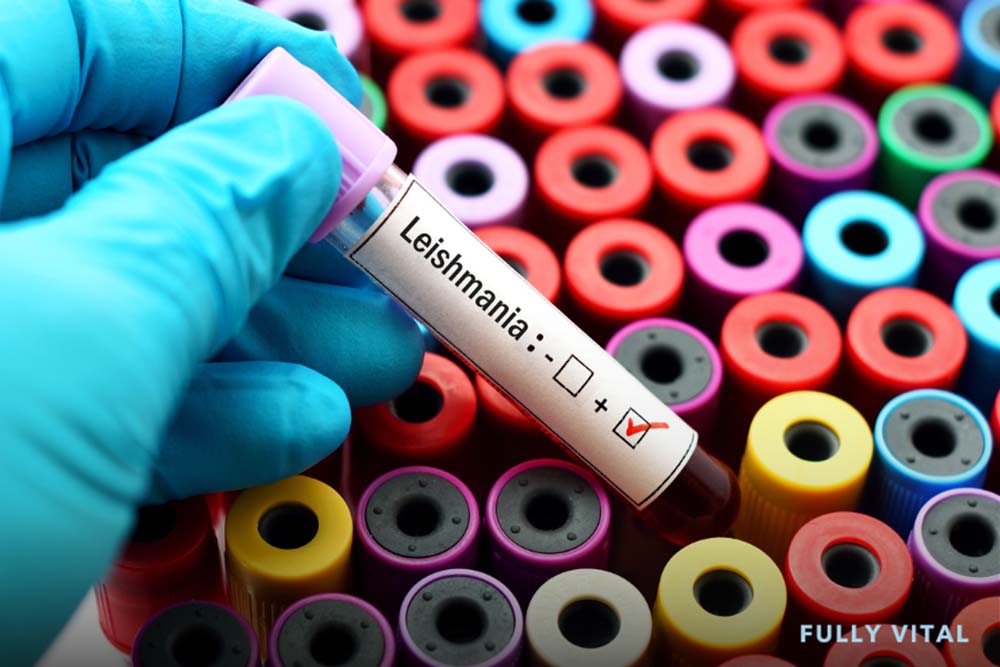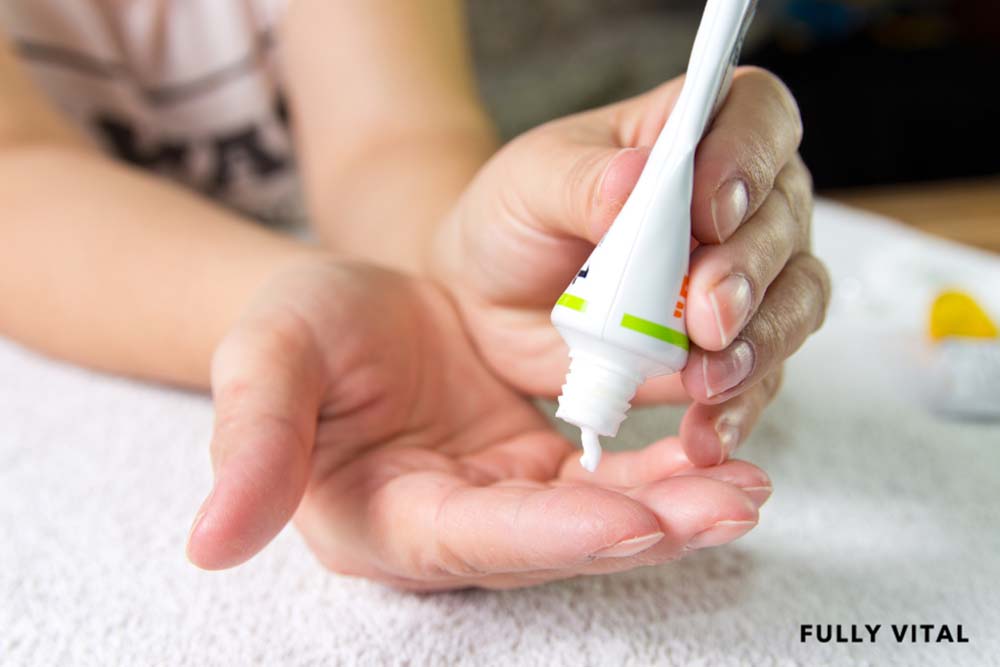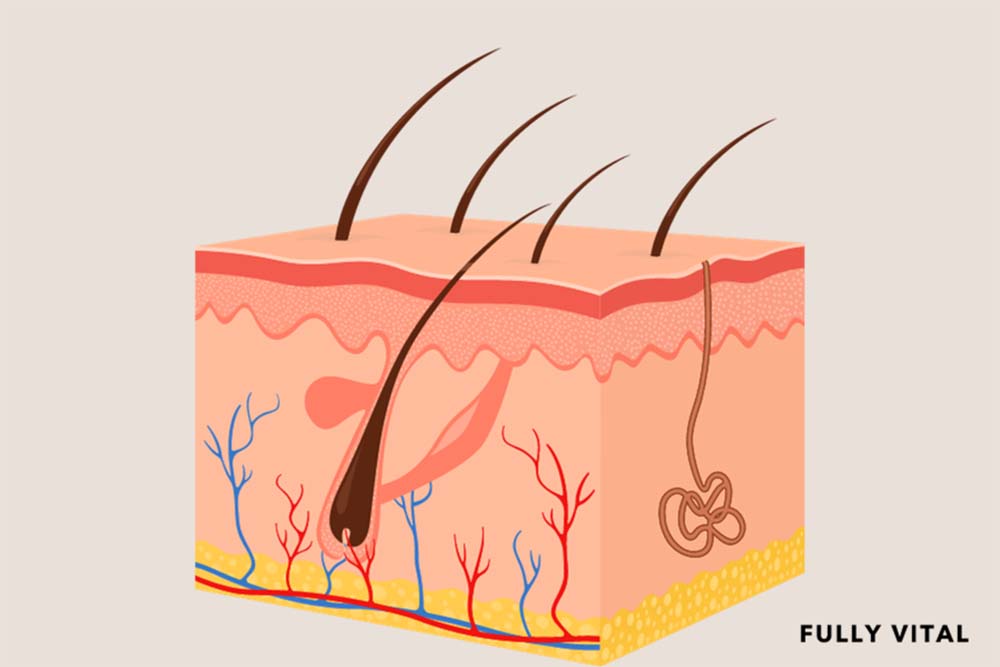
Mucocutaneous Leishmaniasis: Unveiling The Basics
In the world of hair growth, it's essential to understand not only the intricacies of hair care but also some of the more obscure terms that may pop up in your journey.
One such term is mucocutaneous leishmaniasis.
In this article, we'll delve into the details of this condition and explore its significance in the realm of hair health.
So, let's get started!

I LOVE MY HAIR NOW
FullyVital hair serum and hair vitamins made tremendous improvements in my hair. I truly love my hair now.
Dorit S.,
What Is Mucocutaneous Leishmaniasis?
Mucocutaneous leishmaniasis, often abbreviated as MCL, is a lesser-known skin condition caused by a parasite.
This ailment primarily affects the mucous membranes and skin, potentially leading to various complications if left untreated.

Why Is Understanding Mucocutaneous Leishmaniasis Important?
You might wonder why a hair growth enthusiast should bother with a condition like MCL.
Well, understanding it is crucial because even though it doesn't directly impact hair, it can have significant implications for your overall health.
Moreover, a holistic approach to wellness is essential when striving for luscious locks.
How Does Mucocutaneous Leishmaniasis Occur?
Mucocutaneous leishmaniasis occurs when you are exposed to certain types of sandfly bites, which transmit the parasites responsible for the condition.
These parasites then infiltrate your body, leading to the development of MCL symptoms.(1)
What Are The Benefits Of Addressing Mucocutaneous Leishmaniasis?
Addressing Mucocutaneous leishmaniasis promptly offers several benefits:
Preserving Overall Health
Treating MCL can prevent the condition from spreading and causing severe complications.
This is essential because when your body is fighting off a parasitic infection like MCL, it can divert resources away from maintaining healthy hair and skin.
Peace of Mind
By tackling MCL, you can alleviate the worry associated with any health issue.
Peace of mind is a vital component of overall well-being, and it can positively impact hair growth by reducing stress, which is a common contributor to hair loss.
Are There Any Downsides To Mucocutaneous Leishmaniasis?
While addressing Mucocutaneous leishmaniasis is essential, there are some potential downsides to be aware of:
- Treatment Challenges: Managing MCL can be complex and may require specialized medical care. It's not always a straightforward process, and the treatment approach can vary depending on the severity of the condition and the individual's response to therapy.
- Possible Scarring: In some cases, MCL can lead to scarring, which might affect your appearance. Scarring is a concern, especially if it occurs on the face or other visible areas, as it can impact your self-esteem and confidence, potentially affecting your overall well-being.
What Are The Alternatives To Mucocutaneous Leishmaniasis Treatment?
When it comes to treating Mucocutaneous leishmaniasis, various options are available.
These alternatives include:
Medications
Antiparasitic medications are commonly used to combat MCL.
Your healthcare provider will determine the most appropriate medication based on the specific type of parasite causing the infection.(2)
Topical Treatments
Some topical creams and ointments can help alleviate symptoms.
These topical treatments are often used in combination with oral medications to enhance the effectiveness of treatment.
Natural Remedies
Certain natural remedies may complement medical treatment, though they shouldn't replace it.
These can include herbal supplements and homeopathic remedies.
It's essential to consult with a healthcare professional before using any natural remedies to ensure they are safe and effective.
Surgical Intervention
In severe cases, surgical removal of lesions or affected tissues may be necessary.
This is typically considered when other treatment modalities have not been successful or when there is a risk of complications.
How Common Is Mucocutaneous Leishmaniasis?
Mucocutaneous leishmaniasis: just how prevalent is it?
Let's delve into the statistics to get a better understanding:
- Global Prevalence: Mucocutaneous leishmaniasis is relatively rare on a global scale. Compared to other forms of leishmaniasis, such as cutaneous and visceral, it occurs less frequently.
- Regional Variations: The prevalence of mucocutaneous leishmaniasis varies significantly by region. It is more common in certain areas of South America, particularly in countries like Bolivia, Peru, and Brazil. In these regions, it can account for a notable portion of leishmaniasis cases.
- Limited Occurrence: In non-endemic regions, such as North America and Europe, mucocutaneous leishmaniasis is exceedingly rare. Travelers to endemic areas may encounter cases, but they remain infrequent.
What Are The Clinical Features Of Mucocutaneous Leishmaniasis?
Recognizing mucocutaneous leishmaniasis often hinges on its distinct clinical features.
Here's a closer look at what to watch out for:
Common Clinical Features:
- Skin Ulcers: Typically, mucocutaneous leishmaniasis begins with skin ulcers at the site of the sandfly bite. These ulcers can be painful and slow to heal.
- Mucosal Involvement: Over time, the infection can extend to the mucous membranes, affecting areas like the nose, mouth, and throat.
- Nasal Deformities: In severe cases, mucocutaneous leishmaniasis can lead to nasal septum perforation and disfigurement.
- Difficulty Swallowing: As the mucous membranes are affected, individuals may experience difficulty swallowing and speaking.
- Facial Swelling: Advanced cases may result in facial swelling and distortion.
Is Mucocutaneous Leishmaniasis The Most Severe Form Of Leishmaniasis?
Mucocutaneous leishmaniasis is considered one of the more severe forms of leishmaniasis due to its potential for mucosal involvement and disfigurement. However, it's essential to note that the severity can vary among individuals.
Other forms of leishmaniasis, such as visceral leishmaniasis, can be life-threatening if not treated promptly.
How Do You Diagnose Mucocutaneous Leishmaniasis?
Diagnosing mucocutaneous leishmaniasis requires a combination of clinical assessment and laboratory tests:
Clinical Evaluation:
- Healthcare providers examine the appearance and location of skin ulcers and mucosal lesions.
- A thorough medical history, including travel to endemic regions, is crucial for diagnosis.
Laboratory Tests:
- Biopsy: A tissue sample from a skin ulcer or mucosal lesion is examined under a microscope to detect the presence of Leishmania parasites.
- Polymerase Chain Reaction (PCR): PCR tests can identify the parasite's DNA in tissue samples, providing a highly specific diagnosis.3
How Do You Treat Mucocutaneous Leishmaniasis?
Treating mucocutaneous leishmaniasis primarily involves medications, and the approach may vary based on the severity of the infection:
Medications:
- Antiparasitic Drugs: These medications are the primary treatment for mucocutaneous leishmaniasis and include pentavalent antimonials (e.g., sodium stibogluconate) and amphotericin B.
- Treatment Duration: The duration of treatment varies but may extend for several weeks to months, depending on the patient's response to therapy.
Surgical Intervention:
- In severe cases with extensive mucosal involvement or disfigurement, surgical removal of affected tissues may be necessary. Surgery is typically considered when medical treatment alone is insufficient.
- Follow-Up: Close monitoring and follow-up care are essential to ensure the complete resolution of the infection and prevent relapse.
It's important to recognize that the choice of treatment and its success can depend on various factors, including the specific Leishmania species causing the infection and the patient's overall health.
Always consult with a healthcare professional for an accurate diagnosis and appropriate treatment plan for mucocutaneous leishmaniasis.
Unlock The Secret To Timeless Hair With Fully Vital!Experience the transformation you've been waiting for with Fully Vital's science-backed hair growth solutions.
Unveil the potential of your hair and embark on a journey to hair transformation like never before. With Fully Vital, it's more than just hair growth; it's about nurturing a healthier, more vibrant relationship with your locks. |
Final Thoughts On Mucocutaneous Leishmaniasis
Understanding mucocutaneous leishmaniasis is not only essential for your overall health but also for maintaining a vibrant and healthy relationship with your hair.
While this condition may not directly impact your locks, a holistic approach to well-being, including addressing potential health concerns like MCL, is fundamental to achieving your hair growth goals.
At "Fully Vital," we are committed to helping you preserve the vitality of your hair.
Our range of hair growth products is designed to combat the effects of aging on your hair, ensuring that you can enjoy a fuller, healthier mane.
So, as you embark on your journey towards luscious locks, remember that a healthy body contributes to healthy hair.
Take proactive steps to safeguard your well-being, and your hair will thank you for it.
If you have any questions or would like to explore our hair growth products further, please don't hesitate to reach out to our dedicated team of experts.
We're here to support you on your path to healthier, more radiant hair.
Together, we can embrace the beauty of aging gracefully while nurturing the health and vitality of your hair.
Frequently Asked Questions About Mucocutaneous Leishmaniasis
Can MCL affect hair growth?
MCL primarily affects the skin and mucous membranes, so it's unlikely to have a direct impact on hair growth.
However, maintaining overall health is vital for healthy hair, so addressing MCL promptly is still essential.
Can mucocutaneous leishmaniasis be prevented?
While it may not always be preventable, you can reduce the risk of MCL by taking precautions like using insect repellent and wearing protective clothing in areas where sandflies are prevalent.
Is mucocutaneous leishmaniasis contagious?
No, Mucocutaneous leishmaniasis is not contagious.
It spreads through sandfly bites and is not transmitted from person to person.
What are the common symptoms of mucocutaneous leishmaniasis?
Symptoms may include skin sores, ulcers, and nasal or oral mucosal lesions.
These symptoms can vary in severity and may worsen if left untreated.
How is mucocutaneous leishmaniasis diagnosed?
Diagnosis typically involves a medical evaluation, including a physical examination and, in some cases, laboratory tests to confirm the presence of the parasite.
Accurate diagnosis is crucial for determining the appropriate treatment approach.
Can you get mucocutaneous leishmaniasis more than once?
It is possible to contract mucocutaneous leishmaniasis more than once if you are exposed to infected sand flies again.
Having had the disease previously does not confer immunity, so preventive measures, such as using insect repellent and protective clothing, are crucial when in endemic areas.
Is there a vaccine for mucocutaneous leishmaniasis?
As of our knowledge cutoff date in September 2021, there is no approved vaccine specifically for mucocutaneous leishmaniasis.
However, research into leishmaniasis vaccines continues, and there may have been developments since then.
Consult with healthcare authorities or experts for the most current information on vaccine research and availability.
Can mucocutaneous leishmaniasis affect internal organs?
Mucocutaneous leishmaniasis primarily affects the skin and mucous membranes, including the nose, mouth, and throat.
It does not typically involve internal organs, unlike visceral leishmaniasis, which primarily affects internal organs.
Can mucocutaneous leishmaniasis recur after treatment?
Yes, mucocutaneous leishmaniasis can recur after treatment, although it is relatively rare.
Recurrence may be due to incomplete treatment or reinfection. Close monitoring and follow-up care are essential to detect and address any recurrence promptly.
Is it safe to donate blood if you've had mucocutaneous leishmaniasis?
Blood donation guidelines may vary by country and region, but individuals who have had mucocutaneous leishmaniasis are often deferred from donating blood temporarily.
It's essential to follow the specific guidelines provided by the blood donation center in your area to ensure the safety of the blood supply.
Sources:
- Torres-Guerrero, E., Quintanilla-Cedillo, M. R., Ruiz-Esmenjaud, J., & Arenas, R. (2017). Leishmaniasis: a review. F1000Research, 6(1), 750. https://doi.org/10.12688/f1000research.11120.1
- Campbell, S., & Soman-Faulkner, K. (2020). Antiparasitic Drugs. PubMed; StatPearls Publishing. https://www.ncbi.nlm.nih.gov/books/NBK544251/
- Lou, J., Yu, Y., & Dai, F. (2016). Laboratory Test for Diagnosis of Parasitic Diseases. Radiology of Parasitic Diseases, 25–46. https://doi.org/10.1007/978-94-024-0911-6_6







